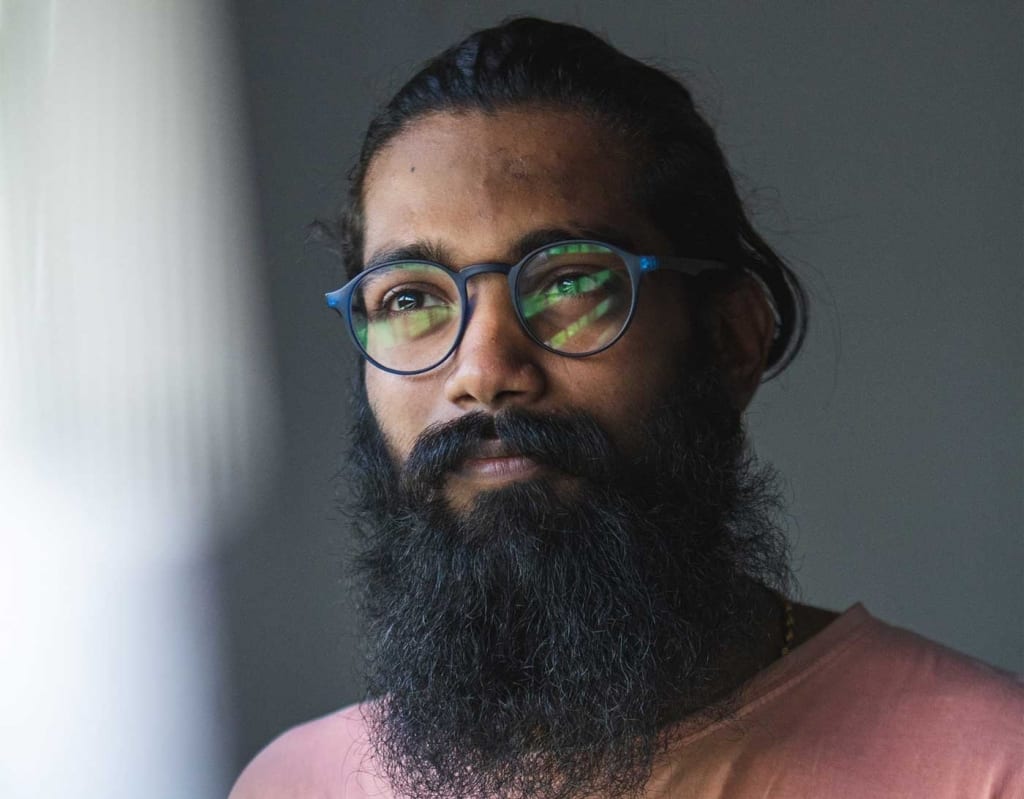By Chelsea Castonguay
Armin is a 29-year-old man with Klinefelter Syndrome from New Zealand, who is of Indian descent. He’s the youngest of four children, and is the beloved little brother of three older sisters. He’s a busy professional who works in telecommunications, and also has several unique hobbies. As he’s not open about his diagnosis beyond his close family and romantic partners, Armin agreed to share his story on the condition of anonymity. To protect his privacy, he’ll be referred to by a pseudonym. While the majority of the stories in this series begin with the subject’s childhood, education, or with the discovery of a diagnosis later in life, Armin learned about his diagnosis in his early teens.
Diagnosis: “I went away and did my own research”
Many men with Klinefelter Syndrome learn of their diagnosis later in life, but Armin’s parents found out about his diagnosis before his birth. However, Armin wasn’t told about his diagnosis until he was 12 or 13, and grew up without any knowledge of the syndrome. He learned of his condition at an annual checkup when the doctor asked his parents if Armin knew of the diagnosis. The doctor explained it to him with his parents present, and Armin accepted the news. While he didn’t have a huge reaction to receiving the news at that time, he “went away and did own research” on the internet.
Treatment: “testosterone treatment…help shift my confidence, and it easier to be more outgoing”
After learning about his diagnosis in 2004, Armin started testosterone therapy. He initially began with a monthly injection in 2005, or 2006. However, after the New Zealand government began funding a quarterly injection, he made the switch and administers his testosterone shot every 12 weeks. He finds the 12 week shot easier, as he doesn’t have to do the shots as frequently. Armin reported the quarterly shot was more consistent than a four week treatment, with less of a drop off when the shot reaches the end of its efficacy. Armin has consistently been on treatment since being diagnosed as a young teenager, but it took a year for the testosterone to fully take effect. During his teenage years, Armin’s doctor followed his case closely. He regularly checked in to see how things were going, or to determine areas he may be struggling in.
Armin stated that as an adult, the benefits from testosterone are easier to reflect upon. While he was a shy child, Armin now has lots of different friend circles, which “completely turned around from when was a kid.” He credits the testosterone treatment with helping shift his confidence, and making it easier to be more outgoing. Before testosterone treatments, Armin recalled having issues with his confidence and social skills. Now, he sees his general practitioner every two years for maintenance. Before testosterone, Armin had a small amount of facial hair, and today has a “great beard.”
Education: he was “a little slow in some areas in his learning”
When asked to reflect on his educational experience, Armin recognized he was “a little slow in some areas in his learning” and was a “very quiet person.” He had a small group of good friends. He was a quiet and shy child, and wasn’t prone to be very expressive with his thoughts or feelings. In class, if he needed help, he was the type to “…not really say much.” He didn’t have any problems in school apart from his reticence to speak up.
While he wasn’t interested in sports or social activities at school, he’d “partake because had to.” His coordination was “fine,” but sports weren’t something he particularly enjoyed. His outgoing nature made it easy for him to go with the crowd and participate. When he did attempt an activity or other endeavor, he did the best he could.
In his intermediary years, Armin’s parents noticed he was “finding difficulties in areas of learning,”, and they arranged for extra tutelage. He went to extra classes outside of school hours to advance his reading, writing, and maths skills. All in all, the extra assistance helped him be more successful in school. Other than extra academic assistance, Armin didn’t attend speech or other cognitive therapies as a child.
The primary school Armin attended was relatively small, with about 20-30 kids per class, and an overall student population of about 100. By the time he entered intermediate school, there was a “much larger volume of kids,” with about 400 students. High school proved to be the biggest transition, as there were 2,000 students. Armin found this move to a larger school “much more nerve-wracking to go into.” When he went into high school, Armin didn’t know any other students, as most of his friends from intermediate went to a different school. There were a few people he knew, but they’d made other friends, which left him to try to make new connections. He hung out with a “bunch of random people on a daily basis until he found his own little circle of proper friends.” Armin eventually made some really good friends, with who he’s been close for over 15 years. The number of friends he made, and the memories they shared “were the greatest, and will stick for the rest of life.” Overall high school was fine: he spent his time there learning, making friends, and getting involved.
In the final years of high school, Armin’s teachers encouraged him to “work out what want to do after school.” This gave students the opportunity to pick classes to support what they wanted to do in university. However, students who didn’t know what path they wanted to take didn’t necessarily have to choose, and could focus on general studies. Armin didn’t participate in sports or school extracurriculars. He continued with the after school learning assistance, which was a common thing for a lot of his peers. His parents were happy to keep sending him so he could connect with the friends he’d made there.
Sharing his diagnosis: “I’m just not really comfortable with sharing that part of my life with them.”
Around 2006 the full reality of his diagnosis hit him. Armin began struggling with the realization he may not be able to have biological kids. In an effort to better understand his diagnosis, Armin “went through a phase of a lot of research” online research, trying to figure out “what it all meant.” His conversation with his doctor about his diagnosis had been over two years prior, and he wanted to try to “get a better sense of it.” The understanding that his path to fatherhood might not be as he anticipated was something he needed to wrap his mind around, particularly as he enjoyed kids. Eventually he “got over it” and got to the point where “he accepted it.” At that time, getting access to information wasn’t as easy as it is now, as his family had a “proper desktop computer, and a lot slower internet.” Whenever Armin had a chance to use the shared family computer, he jumped online to research. He found a global website for Klinefelter Syndrome, and read other men’s stories, which helped him find acceptance for his diagnosis.
While coming to terms with his diagnosis, Armin “wasn’t feeling sad the entire time,” and he “did carry on with life.” He made bigger circles of friends, and found crowds outside of school to connect with. Armin found it important to share his diagnosis with women he dated, and all were ok with it. It wasn’t something he shared on a first date as he felt “what difference is it going to make on that first date?” However, before a relationship became serious, he’d discuss the full extent of his diagnosis with his partner. This required a bit of planning, as he liked to choose the right time to let the person know. He didn’t want “someone to fall in love with him and then find out afterwards.” He was always met with understanding. Many were interested to find out more, and wanted to know what kind of impacts it’d have on him. Some women asked if he needed anything, or needed help of some kind. He reassured them he didn’t need anything, and had grown up with Klinefelter Syndrome. The issue of infertility wasn’t a deal breaker for the women he dated, as they said there were other ways to have children.
While open with the women he has relationships with, those are the only people outside his immediate family who know about Armin’s diagnosis. Armin isn’t as close with his extended family as with his parents and siblings, and isn’t “comfortable with sharing that part of life with them.” He doesn’t feel it’d make any difference if they knew, but part of him is scared they may judge him. As one of the younger people in his extended family, Armin wished to avoid any opportunity for comparison between himself and where his older cousins are in their lives. It’s not really a “path he wants to go down at this point.” He said perhaps he will “extend who he tells in the future but at this point, not comfortable with it.” Since Armin feels his life has been “pretty close to a normal person without Klinefelter Syndrome growing up” he doesn’t want people to start reading up on it, seeing how other people’s lives have been, and assuming that’s what he goes through. He isn’t “keen to tell people about himself and his full experience yet.” As every person with Klinefelter Syndrome is unique and experiences life individually, Armin wishes to avoid having people treat him differently because they know his diagnosis. Overall, he feels he isn’t much different “to an average Kiwi, growing up in New Zealand.” He doesn’t feel as though he’s hiding anything from anyone by keeping his diagnosis private.
Living with XXY: “Every diagnosis is different.”
In his last few years of high school, Armin showed less interest in his academics, but continued to do well by attending extra learning classes outside of school. There were some difficult and challenging classes he didn’t pass or do well in, such as physics and calculus. At the time, he was exploring two separate career paths, debating between engineering and accounting/commerce. Eventually, he managed to get enough credits to get into university, where he chose to pursue a double major in accounting and information management. At first he did ok at school, but as time went on he stopped attending classes. He “just couldn’t get into that mode of sitting down and studying.” As much as he tried, it “just didn’t work,” and thought a change of scenery might help, so he transferred to a different university for the next academic year. The school’s reputation for a lighter academic load, and a more hands-on, practical curriculum appealed to him. While he enjoyed it, he couldn’t find the motivation to study. He didn’t pass many classes, and couldn’t advance to the next year. Instead of continuing to spend money on a degree he realized he didn’t want, Armin left university.
After leaving school, Armin travelled, and spent time with his older sister, who was living in London.. He spent about three months in the UK, and traveled Europe with his sisters and brother-in-law. He enjoyed the opportunity to explore a new city, and learned how to navigate around the city on his own.
Armin returned to NZ, and attended an interview for a job he’d applied for while in the UK. He got the job, which he described as a “straightforward job.” Armin threw himself into work. Even though he told his parents and cousins he planned to return to university, he ultimately never did and doesn’t regret it. He spent four years at his first position, in a call centre based position, then the last 18 months working in social media and gaining project management experience. While he enjoyed working in social media, after several years he felt it was time for a new challenge and decided to make a change. When asked by another company to take a position with similar responsibilities, he jumped at the chance. He’s been with his current company for about four and a half years, where he does project management for the telecommunications industry. His experience in customer service and support translated well into his current role. Armin plans to take a project management certification in the future.
When not at work, Armin enjoys hanging out with family and friends, particularly his three nephews. He and his girlfriend spend time together on the weekends, going out to eat, and taking in New Zealand’s natural beauty. After work on Fridays, Armin, and his coworkers head out for drinks.
In addition to his social activities, Armin is a photographer, and takes photos of events and scenery. He’s worked as a professional photographer for various events, including class photos, and portraits, as well as capturing shots of scenery. He used to play around with a DJ mixer, and regularly attended musical festivals. Armin is also an actor, a “hobby picked up a few years ago.” He’s played supporting roles in movies, commercials, and TV series. While he participates in mostly local acting roles, he’s also been an extra in major motion pictures, as well as upcoming shows on streaming services.
While Armin can’t recall how he came across the Living With XXY YouTube channel, he believes he joined “in the early days,” not long after Ryan launched it in 2017. Around that time, Armin was doing research to update himself on Klinefelter Syndrome, and came across the channel.
When asked what he’d tell other men about being diagnosed with Klinefelter Syndrome, Armin offered this advice: “It’s definitely nothing to be super stressed or concerned about. wouldn’t let it be something that ruins feelings or outlook of the future, let alone a general day! There’s a lot of resources available that you can read online, and with a broad range of experiences and stories available it might set a certain impression of yourself or what life could be like. However, every diagnosis is different; you may be diagnosed with Klinefelter Syndrome, but it doesn’t mean you’re necessarily going to go through the experiences you read about. You will go through your own, unique experience, and it all depends on how you make it and how you deal with it. If you deal negatively, it’s not going to help anyone; it’s not going to help yourself.”
Armin said it’s good to talk to people about it. After learning about his diagnosis, Armin reflected on how he never really opened up about it to anyone, and dealt with it on his own. He joked that he essentially “counseled himself”, and said he wouldn’t recommend that to others navigating their diagnosis. Growing up, Armin didn’t know anyone else with Klinefelter Syndrome, and wondered if he’d ever meet anyone else in the world who had it. In retrospect, Armin would’ve liked to have had the support of knowing others with the same diagnosis. He feels kids and young men growing up now are lucky to have access to Ryan, and his channel. It shows every person is different, and it’s not like everyone with the same diagnosis is going to have the same life. For Armin, living with Klinefelter Syndrome is what you make it, and it’s something he’s accepted as part of his life.



